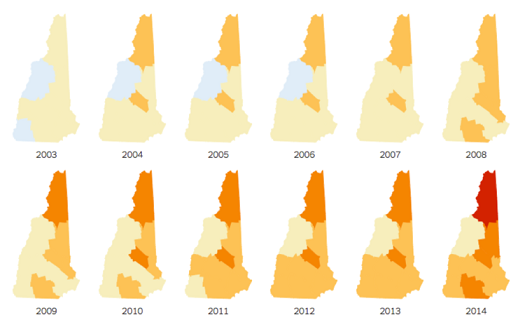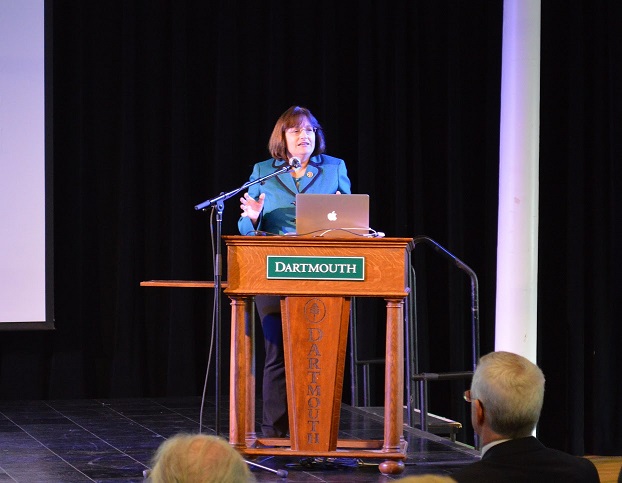Catching Up with Annie
The opioid epidemic
Washington, D.C.,
June 1, 2017
Dear Friends, New Hampshire has the second highest rate of opioid overdoses in the country, is twice the national average for opioid prescriptions, and last in access to treatment. We have lost more citizens than any other state in the nation to fentanyl overdoses, and last year, nearly 500 people died from overdoses. Substance use disorders do not discriminate based on race, age, gender, or class, and we have seen the epidemic impact every corner of the Granite State.
We need a comprehensive and innovative approach to take on this crisis. On Tuesday at Dartmouth College, we gathered to examine the science behind the opioid epidemic for a panel titled Tackling the New Hampshire Opioid Crisis: Harnessing the Power of Science to Break the Cycle. I was joined by doctors, experts, and local community leaders, and I wanted to share some resources with you and highlight some of the progress that is being made both in Washington and New Hampshire.
Speaking at Dartmouth on Tuesday about progress being made to combat the opioid epidemic. New Hampshire is unique in our independent spirit, innovation, and our tenacity. Granite Staters tackle problems with a special blend of creativity and resolve, and many new ideas for combating the opioid epidemic are being pioneered right here in the Granite State. During Tuesday’s panel, Dr. Nora Volkow, the Director of the National Institute on Drug Abuse at the National Institutes of Health (NIH) and Dr. Lisa Marsch, Director of the Dartmouth Center for Technology and Behavioral Health, shared their research on the growth of the opioid epidemic in New Hampshire and the impact of addiction on the brain. Between 2010 and 2015, the number of overdose deaths in New Hampshire has nearly tripled, which is the largest change by any state in this five year period. This crisis is truly tragic. Newborn babies whose mothers suffer from substance use disorders are being born dependent on opioids, and face painful withdrawals. We need to band together to make sure that each and every Granite Stater, young and old, is able to overcome drug addiction. I was very impressed by the students involved in the Creation of the NH Opioid Addiction Prevention, E-Resources, and Support (NHopes) website. Created as a collaboration between Dartmouth Students, researchers, and various organizations, NHopes offers many recovery and resource options on their website. If you, or someone you know is suffering from the opioid crisis, this is an excellent way to learn about some of the different options for help that exist in our communities. The Safe Stations program in Manchester and Nashua has been successful in helping those afflicted get the help they need. This innovative program should be used as a model for other states, and I hope to see it expanded throughout New Hampshire. Safe Stations allow those with substance use disorders to visit any firehouse in the community to get help and treatment. Participants receive medical evaluations, after which they are taken to either a hospital or one of two excellent substance use treatment centers. Since the program opened in Manchester a year ago, more than 1,200 people have utilized the resources offered at various firehouses and there has been a decrease in overdose deaths in these communities. For those people who might not typically seek medical help for addiction, the Safe Station program has opened new doors for them to receive the help they need and reclaim their lives. This comes at a time when the President’s budget does not do enough to give states and localities the resources they need. While we were able to stop the elimination of the Office of National Drug Control Policy, the budget still cuts this vital resource. We should be expanding, rather than cutting, coordination among local, state, and federal law enforcement. We have a long way to go but we’re making progress to combat the opioid epidemic. As the founder and co-chair of the Bipartisan Heroin Task Force, I know that there is a real commitment on both sides of the aisle in Washington to tackle this crisis. I will continue to urge my colleagues to work together to bring increased access to treatment and recovery services, bolster education and prevention efforts, and improve law enforcement’s response to the crisis at hand. I know that together, we can help people in New Hampshire and across the country. Sincerely,
|



